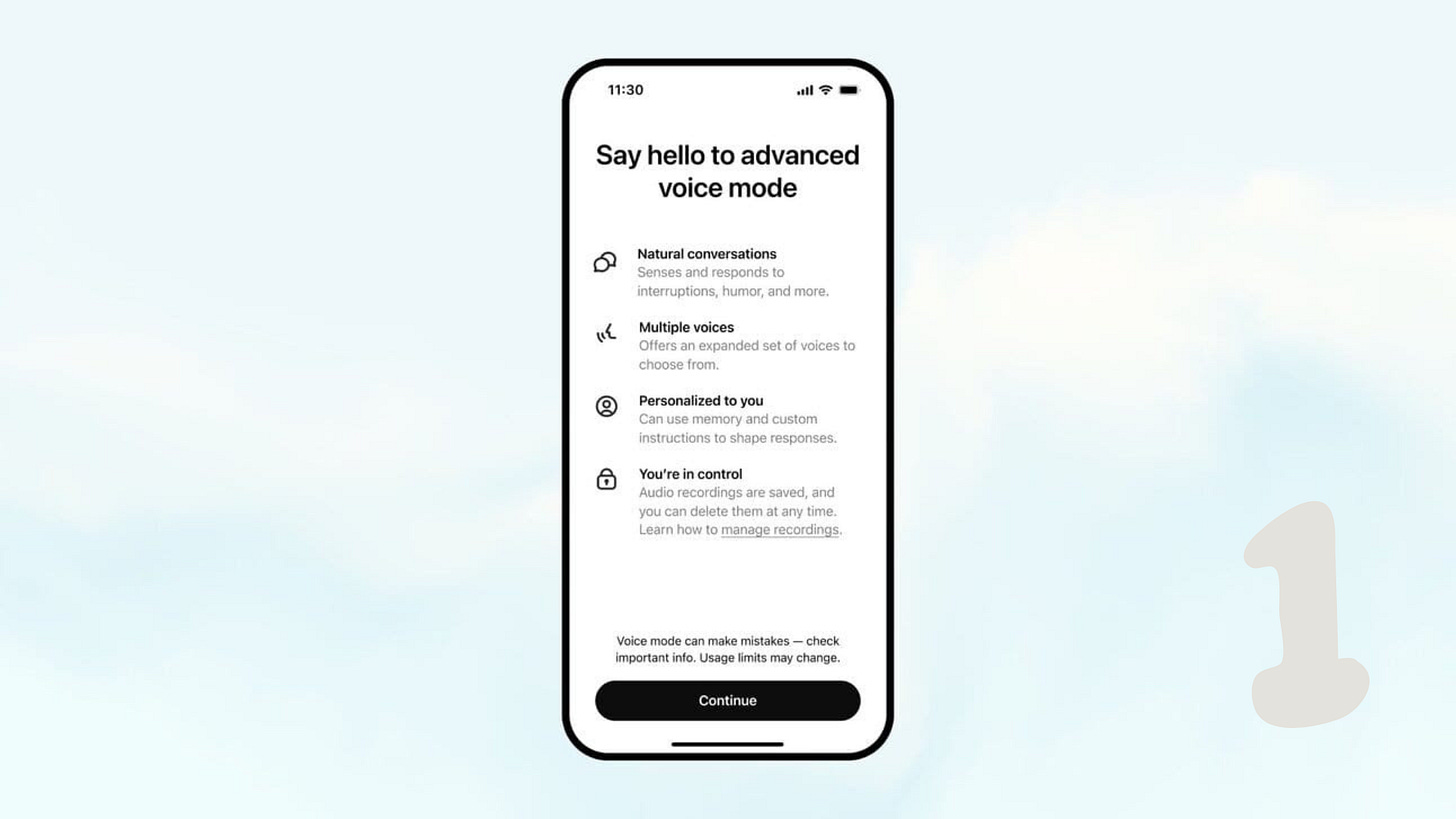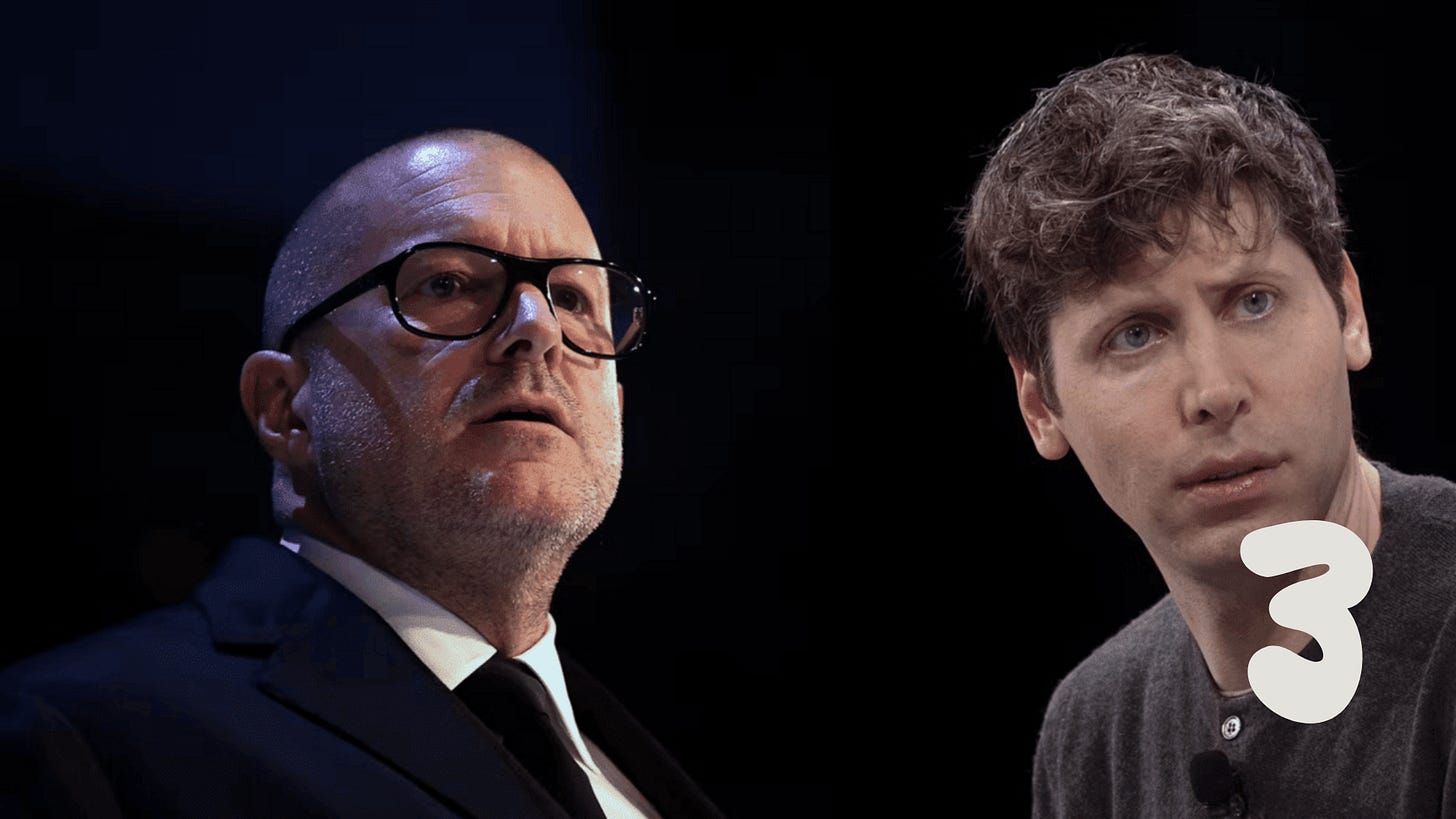🎉 OAI: Advanced Voice Mode, James Cameron Backs AI, The Ive / Altman Duo, Realtime GenAI Gaming, Lionsgate Adopts AI
OpenAI Launches Advanced Voice Mode, The GOAT Cameron Joins Stability AI Board, Jony Ive & Sam Altman Are Redefining Handhelds, EA Dreams Up A Game In Real Time, Lionsgate To Train AI On Their Library
Welcome to this week’s edition of AImpulse, a five point summary of the most significant advancements in the world of Artificial Intelligence.
Here’s the pulse on this week’s top stories:
What’s Happening: OpenAI is finally rolling out an enhanced Advanced Voice Mode (AVM) to all ChatGPT Plus and Teams subscribers this week, featuring new voices and improved functionality to make AI interactions feel more natural and personalized.
The details:
The initial rollout for OpenAI’s new Advanced Voice Mode started in July, but it only ever reached a select few ChatGPT users.
During the delay, OpenAI updated its AVM to integrate Custom Instructions and Memory, allowing for more personalized interactions and conversation recall.
OpenAI also improved AVM’s ability to understand accents and claims smoother, faster conversations, while adding five new nature-inspired voices (and removing the “Sky” voice that sounded like Scarlett Johansson).
AVM will not yet be available in several regions, including the EU, the UK, Switzerland, Iceland, Norway, and Liechtenstein.
Why it matters: With OpenAI CEO Sam Altman writing about AI agents and superintelligence, ChatGPT Advanced Voice Mode feels more relevant than ever. If we’re going to interact with AI every day—it has to sound and feel human—which is exactly what AVM is attempting to accomplish.
Note: If you still don’t have access to Advanced Voice Mode on your ChatGPT app, try uninstalling and reinstalling the app.
What’s Happening: James Cameron, the acclaimed director of Titanic, Avatar, and The Terminator, recently joined the board of directors at Stability AI, the company behind the popular Stable Diffusion text-to-image AI model.
The details:
Cameron, known for pushing technological boundaries in filmmaking, sees the convergence of generative AI and CGI as “the next wave” in visual media creation.
Stability AI’s CEO, Prem Akkaraju, formerly led visual effects company WETA Digital, highlighting the firm’s focus on creative applications of AI.
The move comes as Hollywood grapples with AI’s potential, with some studios embracing the technology while others express concerns over content rights.
Why it matters: Just days after Lionsgate teamed up with AI startup Runway to create a custom video generation model, this move by one of Hollywood’s biggest directors could signal a significant shift in how influential filmmakers are thinking about navigating AI.
What’s Happening: Former Apple design chief Jony Ive has officially confirmed he is collaborating with OpenAI CEO Sam Altman on a new AI-powered hardware device, marking Ive’s first major tech project since leaving Apple.
The details:
Ive and Altman are developing an AI device aimed at creating a computing experience that is “less socially disruptive than the iPhone.”
The project has already raised private funding and plans to raise up to $1 billion in startup funding by year’s end.
Ive’s design firm, LoveFrom, is leading the device’s design with a team that includes former Apple executives Tang Tan and Evans Hankey.
While specifics are still confidential, the device aims to leverage generative AI’s capabilities to handle complex user requests beyond traditional software.
Why it matters: While OpenAI and Apple strengthen their ties with ChatGPT on the iPhone 16, Altman and Ive are building a relationship of their own. Combining Ive's iconic design with OpenAI's models, including o1, could (hopefully) create AI hardware that’s actually useful in our daily lives, unlike the majority of options currently available.
What’s Happening: Electronic Arts (EA) recently demonstrated a new AI-driven concept for user-generated video game content, showcasing how players can create and modify games in real-time using natural language commands.
The details:
EA's "Imagination to Creation" concept video displays two players rapidly building a complex game world and gameplay rules through voice commands without coding expertise.
The system leverages EA’s vast proprietary dataset, including 3D assets, code, gameplay hours, and telemetry events, to train custom creation models.
Players can remix elements from existing EA games and asset libraries, potentially creating entirely new gaming experiences.
Why it matters: This concept could change EA's business model, creating a more interactive and dynamic relationship with their player base while possibly unlocking new revenue streams and extending the lifespan of games. However, it's just a concept video—only time will tell what the future of video game creation will truly look like.
What’s Happening: Lionsgate, the film company behind The Hunger Games, John Wick, and Saw, teamed up with AI video generation company Runway to create a custom AI model trained on Lionsgate’s film catalogue.
The details:
The partnership will develop an AI model specifically trained on Lionsgate’s proprietary content library, designed to generate cinematic video that filmmakers can further manipulate using Runway’s tools.
Lionsgate sees AI as a tool to augment and enhance its current operations, streamlining both pre-production and post-production processes.
Runway is considering ways to offer similar custom-trained models as templates for individual creators, expanding access to AI-powered filmmaking tools beyond major studios.
Why it matters: As many writers, actors, and filmmakers strike against ChatGPT, Lionsgate is diving head-first into the world of generative AI through its partnership with Runway. This is one of the first major collabs between an AI startup and a major Hollywood company — and its success or failure could set precedent for years to come.






